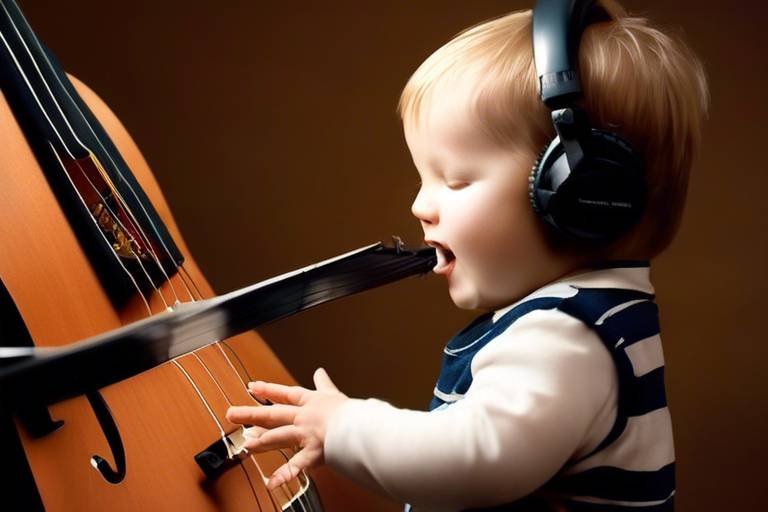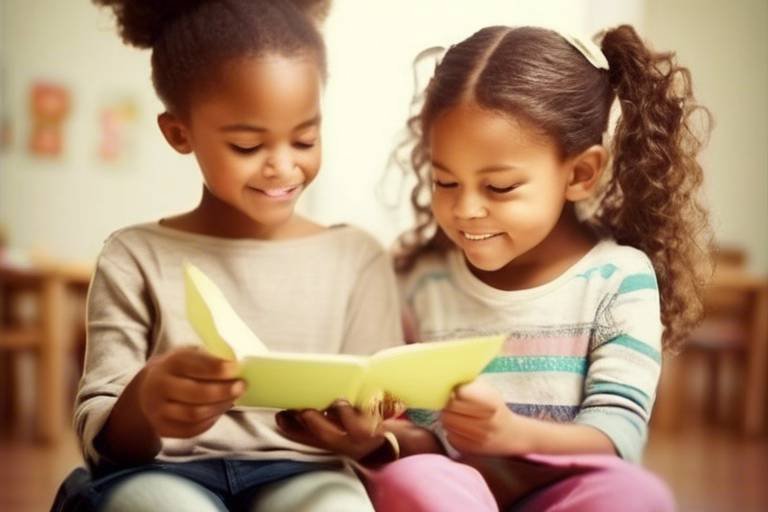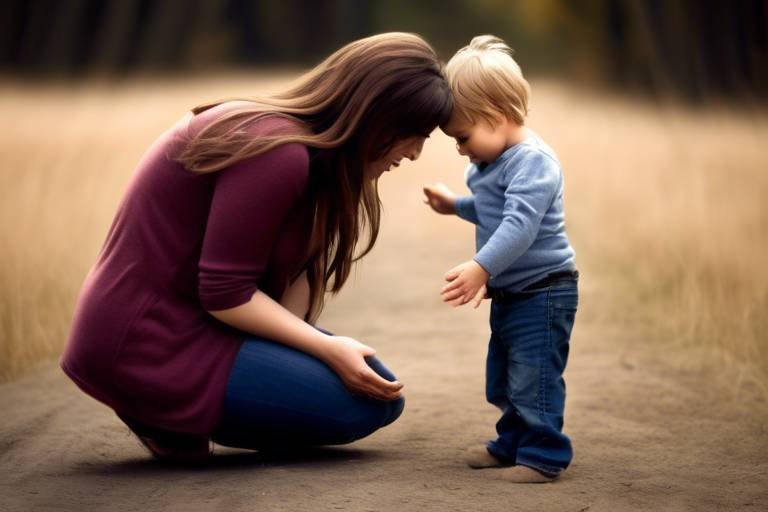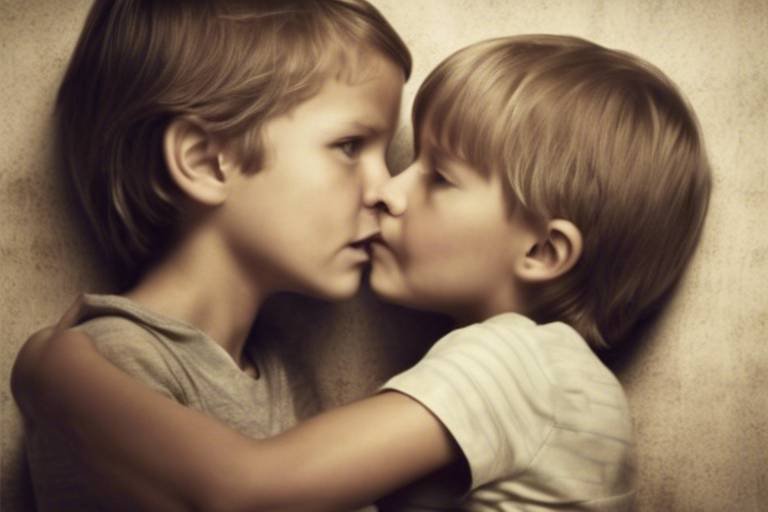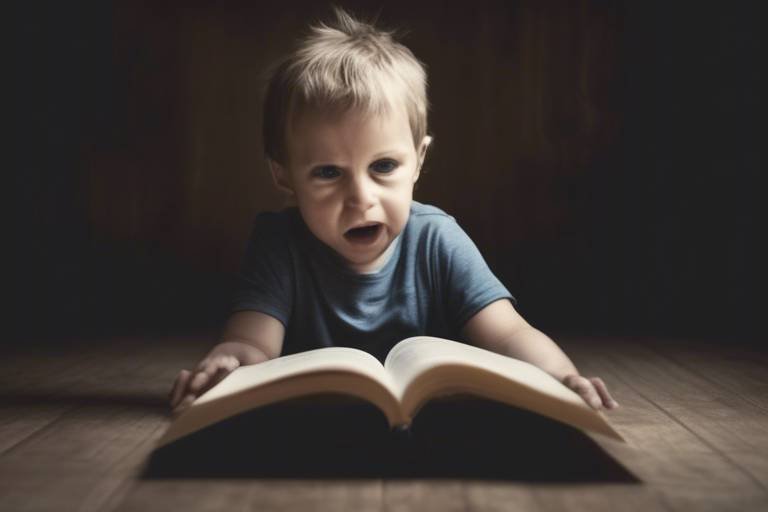The Impact of Music on Child Development
Music is not just a form of entertainment; it's a powerful tool that shapes the minds and hearts of children. From the moment a baby hears a lullaby, the rhythm and melody start to weave their magic, influencing various aspects of development. Imagine a world where children can enhance their cognitive abilities, emotional growth, and social skills—all through the simple act of making music. This article dives deep into how musical exposure in early childhood is crucial for holistic development, setting the stage for lifelong learning and emotional well-being.
Research has shown that music can significantly enhance cognitive development. Children exposed to music often exhibit improved memory retention, better attention spans, and enhanced problem-solving abilities. Think of music as a workout for the brain; just as physical exercise strengthens our muscles, musical activities stimulate neural pathways, making learning more effective. For instance, when children engage in rhythm-based games or learn to play an instrument, they not only have fun but also sharpen their mental faculties. This connection between music and cognitive skills is a golden opportunity for parents and educators to create enriching environments that promote learning through music.
Moreover, music serves as a vital avenue for emotional growth. Engaging with music allows children to express their feelings and understand their emotions better. Have you ever noticed how a particular song can evoke memories or feelings? Children experience this too. Through musical experiences, they develop emotional intelligence, which is essential for navigating life’s ups and downs. For example, when children sing about their feelings or listen to songs that resonate with their experiences, they learn to articulate their emotions, fostering a sense of identity and building self-esteem. This self-expression is crucial for emotional health, providing them with the tools needed to cope with stress and anxiety later in life.
Additionally, music offers creative outlets that encourage exploration and experimentation. Whether it's through learning an instrument, singing, or dancing, children discover diverse ways to express themselves. These creative avenues not only enhance their artistic skills but also help them process their experiences in unique ways. Just like a painter uses colors to convey emotions, children use music to express their inner worlds. This creative engagement is essential for developing a well-rounded personality.
Furthermore, music plays a pivotal role in emotional regulation. It can serve as a calming influence or an energizing force, helping children manage their emotions effectively. When a child feels overwhelmed, listening to soothing music can help them relax, while upbeat tunes can lift their spirits. This ability to use music as a coping mechanism equips children with better strategies to handle stress, laying the groundwork for emotional resilience.
As children participate in musical activities, they also enhance their social skills. Music is inherently collaborative, and when children engage in group singing or play in bands, they learn the value of teamwork and communication. These experiences foster strong social bonds and teach them how to work together towards a common goal. Imagine a group of kids harmonizing their voices; they not only create beautiful music but also learn the importance of listening to one another, sharing ideas, and supporting each other. Such interactions are vital for social development, helping children build friendships and navigate social dynamics.
In conclusion, the impact of music on child development is profound and multifaceted. From boosting cognitive abilities to nurturing emotional growth and enhancing social skills, music is a vital ingredient in the recipe for healthy development. As parents and educators, embracing music in children's lives can lead to a brighter, more harmonious future, filled with creativity and emotional intelligence.
- How does music improve cognitive skills in children?
Music enhances memory, attention, and problem-solving skills by stimulating various parts of the brain, making learning more effective. - Can music help with emotional regulation?
Yes! Music can calm children down or energize them, helping them manage their emotions and cope with stress. - What types of musical activities are best for children?
Activities such as singing, playing instruments, and participating in group music-making can provide the best benefits for children. - How does music aid in language development?
Music improves phonetic awareness and vocabulary through rhythmic and melodic patterns, which are essential for language acquisition.

Cognitive Development
This article explores how music influences various aspects of child development, including cognitive abilities, emotional growth, and social skills, highlighting the importance of musical exposure in early childhood.
Music has a profound effect on cognitive skills in children, enhancing memory, attention, and problem-solving abilities. Imagine a world where melodies and rhythms serve as the foundation for a child’s learning journey; that’s the reality when music is integrated into their daily lives. Research shows that children who engage with music regularly tend to perform better academically. This connection is not merely coincidental; it’s rooted in how music stimulates various parts of the brain responsible for critical thinking and creativity.
One of the most significant cognitive benefits of music is its impact on memory retention. When children learn songs, they are not just memorizing lyrics; they are also strengthening their ability to recall information through auditory cues. This process can be likened to a mental workout, where the brain builds stronger connections and pathways, making it easier for children to retrieve information later. Moreover, engaging with music can improve attention span. Children who participate in musical activities often display greater focus and concentration, skills that are invaluable in a classroom setting.
Furthermore, music fosters problem-solving abilities. When children learn to play an instrument or compose their own songs, they are faced with challenges that require creative solutions. This experience teaches them to think outside the box and approach problems from different angles. In essence, music becomes a tool that equips children with the skills necessary to navigate not only academic challenges but also real-world situations.
To illustrate the connection between music and cognitive development, consider the following table:
| Cognitive Skill | Impact of Music |
|---|---|
| Memory | Enhances recall through auditory learning |
| Attention | Improves focus and concentration |
| Problem-Solving | Encourages creative thinking and innovative solutions |
Incorporating musical activities into a child's routine can be as simple as singing songs during playtime or introducing them to various instruments. Parents and educators can create an enriching environment by:
- Encouraging participation in music classes or workshops
- Integrating musical games that promote memory and attention
- Providing opportunities for improvisation and composition
In conclusion, the influence of music on cognitive development is undeniable. By fostering an environment rich in musical exposure, we can help children unlock their full potential, paving the way for a lifetime of learning and creativity.
1. How does music improve memory in children?
Music enhances memory through auditory learning, making it easier for children to recall information associated with melodies and rhythms.
2. Can music help with attention span?
Yes, engaging with music can significantly improve a child's attention span, as it encourages focus and concentration during musical activities.
3. What types of musical activities are best for cognitive development?
Activities such as singing, playing instruments, and composing music are highly effective in promoting cognitive skills.
4. Is there a specific age when musical exposure is most beneficial?
Early childhood is a critical period for musical exposure, as children's brains are particularly receptive to learning during these formative years.

Emotional Growth
Engaging with music is like opening a treasure chest of emotions for children. It allows them to explore their feelings in a safe and creative way. Imagine a child listening to a lively tune; their body starts to move, and suddenly, they are dancing without a care in the world. This is not just fun—it's a vital part of their . Through music, children learn to identify, express, and manage their emotions, which is essential for developing emotional intelligence.
When children participate in musical experiences, they are not only enjoying themselves but also building resilience. Music acts as a mirror reflecting their feelings back to them, helping them understand and articulate what they are experiencing. For instance, a child might relate a sad song to a recent experience of loss, allowing them to process their feelings in a constructive manner. This leads to greater emotional awareness and the ability to cope with life's ups and downs.
Through music, children learn to communicate their feelings and thoughts creatively. It’s like giving them a new language to express themselves. When they sing or play an instrument, they are not just making sounds; they are telling their stories. This process of self-expression fosters a sense of identity and boosts self-esteem. Imagine a shy child who finds confidence in belting out their favorite song in front of friends—this moment can be transformative. It’s a chance for them to shine and be celebrated for who they are.
Exploring various musical forms provides children with diverse avenues for creativity. Whether it's through singing, playing instruments, or even composing their own tunes, these activities help them develop unique ways to express themselves and process their experiences. Music gives them the freedom to experiment and innovate, much like painting on a blank canvas. This exploration is crucial for their overall emotional development, as it encourages them to think outside the box and embrace their individuality.
Music also plays a significant role in emotional regulation. Think of it as a comforting blanket that children can wrap around themselves when they feel overwhelmed. When a child listens to calming music, it can help them unwind after a long day or soothe their nerves before a big event. On the flip side, upbeat music can energize them when they are feeling down. This ability to choose music that matches their emotional state is a powerful coping strategy that can lead to better mental health outcomes.
In summary, the emotional growth fostered through music is invaluable. It equips children with the tools they need to navigate their feelings, express themselves creatively, and develop resilience. By encouraging musical engagement, parents and educators can create an environment where emotional intelligence flourishes, laying the groundwork for a healthy emotional life.
- How does music help with emotional regulation in children?
Music provides a means for children to calm down or energize themselves, leading to better coping strategies for stress and anxiety.
- Can music improve a child's self-esteem?
Yes, through self-expression in music, children can gain confidence and a stronger sense of identity, which boosts their self-esteem.
- What types of music are best for emotional growth?
There is no one-size-fits-all answer, but a mix of calming and upbeat music can help children manage their emotions effectively.

Self-Expression
Music serves as a powerful tool for in children, allowing them to communicate their thoughts and feelings in ways that words alone sometimes cannot capture. Imagine a child, perhaps feeling overwhelmed or excited, picking up a musical instrument or singing their favorite song. In these moments, they are not just playing notes; they are weaving a tapestry of emotions and experiences that reflect their inner world. This creative outlet is essential for developing a sense of identity, as it encourages children to explore who they are and how they relate to the world around them.
When children engage with music, they often find themselves in a safe space where they can express their individuality. Whether it’s through dancing, singing, or playing an instrument, music allows them to experiment with different aspects of their personality. This process is akin to painting on a canvas; each note and rhythm adds color and depth to their self-portrait. As they navigate through various musical styles, they learn to appreciate diversity in expression, which is crucial for their emotional health.
Moreover, the act of creating or performing music can significantly boost a child's self-esteem. When they successfully learn a new song or master a challenging piece, the sense of accomplishment can be exhilarating. This feeling is not just fleeting; it lays the groundwork for resilience. Children learn that effort leads to success, and this understanding can carry over into other areas of their lives, from academics to personal relationships.
In addition to personal growth, music also fosters emotional intelligence. Through lyrics and melodies, children learn to identify and articulate their emotions. For instance, a song about friendship might resonate with a child experiencing social dynamics at school, helping them to process their feelings and communicate them effectively. This ability to express emotions not only enhances their interpersonal relationships but also equips them with the tools to navigate the complexities of life.
Furthermore, engaging in musical activities often involves collaboration with others, whether in a choir, band, or informal group setting. This shared experience not only strengthens social bonds but also teaches vital skills such as teamwork and empathy. Children learn to listen to one another, respect different viewpoints, and work together towards a common goal, all of which are essential components of effective communication.
In conclusion, the role of music in fostering self-expression in children cannot be overstated. It is a multifaceted journey that enhances their emotional growth, boosts their confidence, and nurtures their social skills. By encouraging musical exploration, parents and educators can provide children with invaluable opportunities to express themselves and develop a deeper understanding of their emotions and identities.
- How does music help with self-expression in children?
Music provides children with a creative outlet to express their feelings and thoughts, allowing them to communicate in ways that words alone may not convey. - What are some ways to encourage musical self-expression?
Encouraging children to participate in music classes, play instruments, or engage in singing and dancing can foster their self-expression. - Can music improve a child's self-esteem?
Yes, successfully learning and performing music can boost a child's self-esteem and help them develop resilience. - How does music foster emotional intelligence?
Through music, children learn to identify and articulate their emotions, which enhances their emotional intelligence and interpersonal relationships.

Creative Outlets
Music is not just a form of entertainment; it's a powerful creative outlet for children that can significantly shape their development. When children engage with music, whether by playing an instrument, singing, or dancing, they are tapping into a world of creativity that allows them to express their thoughts and feelings in unique ways. Imagine a child strumming a guitar or banging on a drum; each beat and note becomes a reflection of their inner world. This is where creativity flourishes!
Through various musical forms, children can explore different genres and styles, which opens up a treasure trove of opportunities for self-expression. For instance, a child might find solace in the gentle melodies of classical music or exuberance in the lively beats of pop. Each genre offers a distinct way to convey emotions, helping children process their experiences and articulate their feelings. This process is akin to painting on a canvas; just as an artist uses colors to express their vision, children use music to express their emotions.
Moreover, engaging in musical activities can lead to the development of crucial life skills. When children participate in group music sessions, they learn to collaborate, listen, and respect others' contributions. These interactions are vital as they help children understand the importance of teamwork and communication. For example, in a band setting, each musician must listen to one another to create a harmonious sound, teaching them the value of cooperation and compromise.
In addition to fostering social skills, music also enhances imagination. Children often invent their own lyrics, create rhythms, or even choreograph dances, which encourages them to think outside the box. This imaginative play is crucial as it not only boosts creativity but also enhances problem-solving skills. Just like a puzzle, children learn to piece together their thoughts and ideas through music, leading to innovative ways of thinking.
Furthermore, music can serve as a therapeutic outlet. In moments of stress or anxiety, children might turn to their favorite songs or instruments to find comfort. This ability to use music as a tool for emotional regulation is essential for their mental health. It’s like having a friend who always knows how to lift your spirits or calm you down—music can be that friend.
To sum it up, the role of music as a creative outlet in a child's life is profound. It encourages self-expression, enhances social abilities, and fosters imagination. As parents and educators, recognizing the importance of musical exposure can help create an enriching environment where children can thrive creatively. So, why not encourage your little ones to explore the world of music? You might be surprised at the amazing things they can create!
- How does music help with a child's creativity?
Music encourages children to express themselves in unique ways, fostering imaginative thinking and problem-solving skills. - What types of musical activities can I introduce to my child?
Consider singing, playing instruments, dancing, or even creating their own songs to enhance their musical experience. - Can music improve social skills in children?
Yes! Participating in group music activities teaches children teamwork, communication, and respect for others’ contributions. - Is there a specific age to start exposing children to music?
It's never too early! Even infants can benefit from listening to music, and the exposure can continue to grow as they develop.

Emotional Regulation
Music is not just a collection of sounds; it serves as a powerful tool for in children. When kids engage with music, they often find themselves in a world where they can express and manage their feelings more effectively. Think of music as a magic key that unlocks the door to emotional understanding and control. Whether it's the soothing melodies that help calm a restless mind or the upbeat rhythms that energize a gloomy day, music can significantly influence how children cope with their emotions.
For instance, when a child feels overwhelmed or anxious, playing a gentle tune can create a soothing atmosphere that promotes relaxation. Similarly, when they are feeling low, an upbeat song can act as a burst of energy, lifting their spirits. This ability to choose music that resonates with their emotional state not only helps them feel better but also teaches them how to manage their feelings in a healthy manner. It's like having a personal emotional toolkit at their disposal!
Moreover, music provides a safe space for children to explore and express their emotions. Through singing, dancing, or even just listening, they can process feelings of joy, sadness, anger, and excitement. This exploration is essential for developing emotional intelligence, which is crucial for their overall well-being. Children who regularly engage with music often demonstrate better emotional resilience, allowing them to bounce back from setbacks more effectively.
To illustrate how music aids in emotional regulation, consider the following scenarios:
- Calming Down: After a long day, a child might listen to soft instrumental music to unwind, helping them transition from a busy day to a peaceful evening.
- Boosting Energy: On days when they feel sluggish, an upbeat song can inspire them to dance around the room, releasing pent-up energy and enhancing their mood.
- Emotional Release: Singing along to a favorite song can help children articulate feelings they may struggle to express verbally, providing a cathartic release.
In summary, music is a vital ally in teaching children how to navigate their emotional landscapes. By providing them with the tools to understand and regulate their feelings, we empower them to build resilience and emotional intelligence. As they grow, these skills will not only enhance their personal experiences but also improve their relationships with others, setting a solid foundation for their future.
1. How does music help with emotional regulation in children?
Music helps children express their emotions, provides comfort during stressful times, and teaches them coping strategies through engagement with different musical forms.
2. Can all types of music aid emotional regulation?
Yes, different types of music can serve various emotional needs. Calming music can help with relaxation, while upbeat music can boost energy and mood.
3. How can parents encourage their children to use music for emotional regulation?
Parents can create a musical environment at home, introduce their children to various genres, and encourage them to express their feelings through singing or playing instruments.

Social Skills
When it comes to developing social skills in children, music is like a magical glue that binds them together. Think about it: when kids engage in musical activities, whether it’s singing in a choir, playing in a band, or simply dancing together, they are not just making sounds; they are learning to communicate, collaborate, and connect with one another. These experiences are crucial for fostering teamwork and building relationships, which are essential components of social development.
Participating in group music-making encourages children to listen to one another, share ideas, and negotiate roles. For instance, in a band, each member has a specific part to play, and they must work in harmony to create a beautiful piece. This collaboration teaches them the importance of working together towards a common goal. It’s like being part of a puzzle; each child is a piece that contributes to the bigger picture. When they see how their contributions matter, it boosts their confidence and encourages them to engage more with their peers.
Moreover, music provides a safe space for children to express themselves and interact with others. During musical activities, they are often encouraged to share their thoughts and feelings, which helps them develop empathy and understanding. For example, when children perform a song that tells a story, they learn to interpret emotions and perspectives that might be different from their own. This not only enhances their emotional intelligence but also equips them with the skills to navigate social situations more effectively.
Here are some key ways music enhances social skills:
- Communication: Music encourages children to articulate their thoughts and emotions, improving their verbal and non-verbal communication skills.
- Teamwork: Collaborative music-making fosters a sense of belonging and teaches children how to work as part of a team.
- Conflict Resolution: Engaging in group activities helps children learn how to resolve disagreements in a constructive manner.
- Social Interaction: Music provides opportunities for children to meet and interact with peers, building friendships and social networks.
In summary, the impact of music on social skills is profound. It not only enhances communication and teamwork but also nurtures empathy and emotional understanding. By incorporating music into daily activities, parents and educators can create enriching environments that promote healthy social interactions among children. So, the next time you see kids jamming together or dancing in a circle, remember that they are not just having fun; they are building the social skills that will serve them well throughout their lives.
- How does music help children develop social skills?
Music encourages teamwork, communication, and empathy, allowing children to interact and collaborate with their peers effectively. - What types of musical activities are best for enhancing social skills?
Group activities like singing in choirs, playing in bands, or participating in music classes are excellent for fostering social interactions. - Can music help shy children become more social?
Yes! Engaging in musical activities can provide a comfortable platform for shy children to express themselves and connect with others.

Language Development
Music plays a crucial role in language acquisition, acting as a powerful tool that enhances children's phonetic awareness and vocabulary. Imagine a world where every note and rhythm helps unlock the secrets of language! When children engage with music, they are not just having fun; they are also building the foundational skills necessary for effective communication. The rhythmic and melodic patterns in songs create a captivating environment where children can learn to recognize sounds, syllables, and even the nuances of speech. This connection between music and language is not just fascinating; it’s essential for early childhood development.
One of the most significant aspects of music's influence on language development is its ability to improve phonetic awareness. When children listen to music, they are exposed to various sounds and rhythms that help them understand the building blocks of language. For instance, clapping to the beat of a song or singing along with catchy melodies encourages children to break down words into smaller parts. This phonetic awareness is foundational for reading and comprehension, making musical activities not just enjoyable but also educational.
To illustrate the impact of music on phonetic awareness, consider the following table that outlines some effective musical activities:
| Musical Activity | Language Skill Enhanced |
|---|---|
| Clapping to Rhythms | Sound Recognition |
| Singing Nursery Rhymes | Syllable Awareness |
| Playing with Instruments | Sound Differentiation |
| Creating Song Parodies | Vocabulary Expansion |
Additionally, engaging with music significantly boosts a child's vocabulary. When children sing songs or listen to lyrics, they encounter new words in a memorable context. This exposure is vital for vocabulary expansion, as it allows children to connect words with emotions and experiences. For instance, a song about going to the zoo introduces children to various animals, encouraging them to use those words in everyday conversations. As they sing along, they are not just memorizing lyrics; they are learning to articulate their thoughts and feelings more clearly.
Moreover, the repetitive nature of music helps reinforce language patterns. Children often find themselves singing the same songs over and over, which solidifies their understanding of vocabulary and sentence structure. This repetition is akin to practicing a sport; the more you practice, the better you get! Thus, incorporating music into daily routines can significantly enhance a child's language skills in a fun and engaging way.
In conclusion, the relationship between music and language development is profound. By harnessing the power of music, parents and educators can create enriching environments that foster not only phonetic awareness but also vocabulary growth. So, the next time you sing a lullaby or dance to a catchy tune, remember that you are not just entertaining your child; you are also nurturing their language skills in a delightful and impactful manner.
- How does music improve phonetic awareness in children?
Music helps children recognize and differentiate sounds, which are essential for understanding language structure. - Can singing songs really expand a child's vocabulary?
Absolutely! Engaging with lyrics introduces children to new words and phrases, enhancing their language skills. - What types of musical activities are best for language development?
Activities like clapping to rhythms, singing nursery rhymes, and playing instruments are excellent for fostering phonetic awareness. - How can parents incorporate music into their child's daily routine?
Parents can sing during playtime, use music during storytime, or create fun songs about daily activities to make learning enjoyable.

Phonetic Awareness
Phonetic awareness is a critical skill in a child's early development, acting as the foundation for their future reading and language comprehension abilities. When children are exposed to music, they begin to recognize sounds, syllables, and patterns in a way that is both engaging and enjoyable. This exposure is not just about listening; it’s about actively participating in musical activities that heighten their awareness of phonetics. For instance, when children sing along to their favorite songs, they are not merely repeating words; they are dissecting the sounds that make up those words. This process helps them develop a keen ear for the nuances of language.
Research suggests that children who engage with music regularly show enhanced phonetic skills compared to their peers who do not have such exposure. The rhythmic and melodic elements of music create a unique learning environment where children can explore the sounds of language in a playful manner. By clapping to the beat or singing in different pitches, they learn to differentiate between various phonetic components. This playful interaction with music can be likened to a game, where the stakes are high, and the rewards are even greater—mastery of language at an early age.
To illustrate the impact of music on phonetic awareness, consider the following table that summarizes key activities and their benefits:
| Musical Activity | Benefits for Phonetic Awareness |
|---|---|
| Singing Songs | Enhances vocabulary and sound recognition |
| Clapping Rhythms | Improves syllable segmentation and timing |
| Listening to Rhymes | Develops rhyme recognition and phonemic awareness |
| Playing Musical Instruments | Encourages auditory discrimination and coordination |
Moreover, incorporating musical elements into daily activities can further enhance phonetic awareness. For example, parents and educators can use nursery rhymes or interactive musical games to create a fun learning atmosphere. When children are encouraged to sing along or even create their own songs, they are not just having fun; they are also honing their ability to recognize and manipulate sounds. This playful approach fosters a love for language that can last a lifetime.
In conclusion, the relationship between music and phonetic awareness is undeniable. By integrating music into early childhood education, we can provide children with the tools they need to succeed in language acquisition. So, the next time you play a song or sing a tune, remember that you are not just entertaining your child; you are also enriching their cognitive development in profound ways.
- How does music enhance phonetic awareness?
Music helps children recognize sounds and patterns, which are essential for reading and language skills. - What types of musical activities are best for phonetic development?
Singing, clapping rhythms, and listening to rhymes are excellent activities that promote phonetic awareness. - At what age should I start introducing music to my child?
It's beneficial to introduce music as early as infancy, as it supports cognitive and language development from the start. - Can musical exposure impact other areas of development?
Yes, music influences cognitive, emotional, and social skills, making it a holistic tool for child development.

Vocabulary Expansion
This article explores how music influences various aspects of child development, including cognitive abilities, emotional growth, and social skills, highlighting the importance of musical exposure in early childhood.
Music has a profound effect on cognitive skills in children, enhancing memory, attention, and problem-solving abilities. Understanding this connection can help parents and educators foster better learning environments.
Engaging with music allows children to express and understand their emotions. This section delves into how musical experiences contribute to emotional intelligence and resilience in young minds.
Through music, children learn to communicate their feelings and thoughts creatively. This fosters a sense of identity and boosts self-esteem, essential components of emotional health.
Exploring various musical forms provides children with diverse avenues for creativity, helping them develop unique ways to express themselves and process their experiences.
Music aids in emotional regulation by providing a means for children to calm down or energize themselves, leading to better coping strategies for stress and anxiety.
Participating in musical activities enhances social interaction and teamwork among children. This section examines how music fosters collaboration and communication skills essential for social development.
Music plays a crucial role in language acquisition by improving phonetic awareness and vocabulary. This part discusses how rhythmic and melodic patterns contribute to linguistic skills.
Singing songs and engaging with lyrics can significantly boost a child's vocabulary. When children listen to music, they are exposed to a variety of words and phrases that they might not encounter in everyday conversation. For example, catchy tunes often include repetitive phrases that make learning new words fun and engaging. This repetition helps solidify their understanding and retention of vocabulary.
Moreover, music introduces children to different contexts and themes, allowing them to learn words associated with emotions, actions, and various subjects. For instance, a song about animals can teach children the names of different creatures, while a tune about seasons can introduce them to weather-related vocabulary.
To illustrate the impact of music on vocabulary expansion, consider the following:
| Type of Song | Vocabulary Themes |
|---|---|
| Animal Songs | Names of animals, sounds they make |
| Seasonal Songs | Weather terms, seasonal activities |
| Counting Songs | Numbers, basic math concepts |
| Emotion Songs | Feelings, descriptive words |
In addition to enhancing vocabulary, music also aids in phonetic awareness, which is vital for reading skills. When children sing along to songs, they practice the sounds of letters and syllables, laying a strong foundation for literacy. Engaging with music can be a playful yet educational experience, making it easier for children to grasp complex language concepts.
Ultimately, the relationship between music and vocabulary development is a beautiful symphony that resonates through a child's learning journey. By incorporating musical activities into daily routines, parents and educators can create a vibrant environment that nurtures linguistic growth.
- How does music improve cognitive skills in children?
Music enhances memory, attention, and problem-solving abilities through engaging activities that stimulate the brain. - Can music help with emotional regulation?
Yes, music provides a means for children to express their feelings and cope with stress effectively. - What types of music are best for language development?
Any music that includes repetitive lyrics, themes, and engaging melodies can support language acquisition. - How can I incorporate music into my child’s daily routine?
Consider singing songs together, playing musical games, or listening to diverse genres to enrich their musical exposure.
Frequently Asked Questions
- How does music enhance cognitive development in children?
Music stimulates various parts of the brain, improving memory, attention, and problem-solving skills. When children engage with music, they often find it easier to concentrate and retain information, which can lead to improved academic performance.
- Can music help with emotional growth in kids?
Absolutely! Music provides a unique outlet for children to express their feelings and understand their emotions. Engaging with music can foster emotional intelligence, helping kids navigate their feelings and develop resilience.
- What role does music play in developing social skills?
Participating in musical activities encourages teamwork and collaboration. When children engage in group music-making, they learn to communicate, share, and work together, which are essential skills for social development.
- How does music aid in language development?
Music helps improve phonetic awareness and vocabulary. The rhythmic and melodic patterns in songs make it easier for children to recognize sounds and syllables, laying a strong foundation for reading and language comprehension.
- What types of musical activities can boost a child's cognitive skills?
Activities like singing, playing musical instruments, and engaging in rhythmic games can significantly enhance cognitive skills. These activities not only make learning fun but also stimulate brain development.
- Is there a specific age when musical exposure is most beneficial?
Early childhood is a critical period for musical exposure. The earlier children are introduced to music, the more they can benefit from its impact on cognitive, emotional, and social development.
- Can music help children cope with stress and anxiety?
Yes! Music can be a powerful tool for emotional regulation. It provides children with a means to calm down or energize themselves, helping them develop better coping strategies for stress and anxiety.

